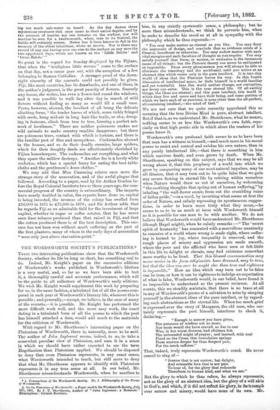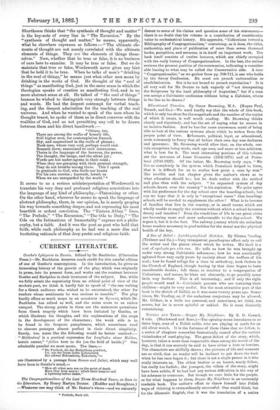THE WORDSWORTH SOCIETY'S PUBLICATIONS.* MESE two interesting publications show that
the Wordsworth Society, whether its life be long or short, has something real to do. Indeed, Mr. Knight's paper on the successive editions of Wordsworth's works published in Wordsworth's lifetime is a very useful, and, so far as we have been able to test it, a thoroughly careful and accurate performance, which will be the guide to all collectors of Wordsworth's early editions. We wish Mr. Knight would supplement this work by preparing for us, in the same fashion, a tabulated list of all the poems com- posed in each year of Wordsworth's literary life, wherever this is possible ; and generally,—except, we believe, in the case of many of the sonnets,—it is possible. Mr. Knight has performed the more difficult work well, and the more easy work, the exact dating in a tabulated form of all the poems to which the poet has himself attached a date, would add much to the materials for the criticism of Wordsworth.
With regard to Mr. Shorthouse's interesting paper on the Platonism of Wordsworth, there is, naturally, more to be said. The author of John Inslesant seems, indeed, to us, to take a somewhat peculiar view of Platonism, and uses it in a sense in which we should have rather expected to see the term Hegelianism than Platonism applied. We should be disposed to deny that even Platonism represents, in any exact sense, what Wordsworth intended to teach, but still more to deny that what Mr. Shorthonse appears to identify with Platonism represents it in any true sense at all. In our belief, Mr. Shorthouse misunderstands Wordsworth, when he ascribes to
* 1. Transactions of the Wordsworth Society. No. I. Bibliography of the Poems of Wordsworth.
2. OA the Platonism of Wordsworth: a Paper read to the Wordworth Society, July 19th, 1881. By J. U. Bborthonse, Author of "John Inglesuut: a Itomause.' Birmingham: Cornish Brothers.
him, in any strictly systematic sense, a philosophy ; but he more than misunderstands, we think he perverts him, when he seeks to describe his creed as at all in sympathy with the philosophy which he thus expounds :—
4' You may make matter as eternal as you like. You may deny the argument of design, and conclude that no evidence exists of a Creator, beneficent or otherwise. You may endow matter with such vital energies and such faculties of thought as you require. You may satisfy yourself that force, or motion, or extension is the immanent cause of all things ; but the Platonic theory can never be antiquated or impossible. From every phenomenon you will alwaysi be able to eliminate the transitory and the accidental, until you arrive at an abstract idea which exists only in the pure intellect. It is into this world of ideas that the Platonist forces his way. In this fourth dimension of intellectual space, he finds 'himself in a world familiar and yet wonderfal. Into this world neither change, nor corruption, nor decay can enter. This is the true eternal life. Of all earthly things, the ideas are eternal ; and this pure intellect, this world in which they live and move and have their being, and some portion of which we have each of us received, is none other than the all-perfect, all-containing intellect,—the mind of God."
We are not sure that we quite correctly apprehend this as meaning that the true Divine Mind is pure, abstract intellect. But if that is, as we understand Mr. Shorthonse, what he means, nothing seems to us less like Wordsworth's own faith, espe- cially on that high poetic side in which alone the readers of his poems know it.
Wordsworth's own profound faith seems to us to have been that man has a witness in himself,—and much more in his moral power to resist and control and subdue his own nature, than in any purely intellectual life,—that there is something in him which survives death, and even grows by death. When Mr. Shorthonse, speaking on this subject, says that we may be all wrong about it, that this prophecy of a world into which we grow by conquering many of our most natural impulses, may be all illusion, that it may turn out to be quite false that we gain any secure footing in eternal life by retiring within tmrselves when Nature would draw us out of ourselves, by welcoming "the soothing thoughts that spring out of human suffering," by- inhaling "the wall-flower scents from out the crumbling ruins of fallen pride,"—in a word, by inverting what seems at first the order of Nature, and calmly repressing its spontaneous sugges- tions, in order to learn more truly what they mean,—he seems to us to be as much at issue with Wordsworth himself as it is possible for one man to be with another. We do not believe that Wordsworth would have understood Mr. Shorthonse (though Hegel might), when he calmly remarks :--" The 'secret. spirit of humanity' has consented with a marvellous unanimity to conceive of a world where wrong is made right, where suffer- ing is turned to joy, where inequality is removed, and the rough places of misery and oppression are made smooth, where the poor and the afflicted who have seen or felt little in this life to delight or elevate, may find existence somewhat. more worthy to be lived. That this blessed consummation may never arrive in the form religionists have dreamed, may be true, but that the idea can ever be aught else than true and righteous is impossible." How an idea which may turn out to be false can be true, or how it can be righteous to indulge an expectation of what is false, Wordsworth would, in our belief, have found it as impossible to understand as the present reviewer. At all events, this we steadily maintain, that there is no trace at all in any of Wordsworth's poems of a salvation to arise by steeping yourself in the abstract ideas of the pure intellect, or by regard- ing such abstractions as the eternal life. When too much grief is expressed over the story of Margaret, the old man, who cer- tainly represents the poet himself, interferes to check it,
declaring,—
" Enough to sorrow you have given,
The purposes of wisdom ask no more. Nor more would she have craved, as Clue to one Who, in her worst distress, had ofttimes felt The unbounded might of prayer ; and learned, with soul Fixed on the Cross, that consolation springs From sources deeper far than deepest pain, For the meek sufferer."
That, indeed, truly represents Wordsworth's creed. He never ceased to sing of-
" Sorrow that is not sorrow, but delight, And miserable love that is not pain To hear of, for the glory that redounds Therefrom to human kind, and what we are."
But the glory to which he thus refers, he always represents, not as the glory of an abstract idea, but the glory of a will akin to God's, and which, if it did not reflect hie glory, in its triumph over sorrow and misery, would have none of its own. Mr.
Shorthouse thinks that "the synthesis of thought and matter" is the key-note of every line in "The Excursion." By the "synthesis of thought and, matter," he means, apparently, what he elsewhere expresses as follows :—" The ultimate ele- ments of thought are not merely correlated with the ultimate elements of things. They are the elements of things them- selves." Now, whether that be true or false, it is no business of ours here to examine. It may be true or false. But we do maintain that true or false, Wordsworth never gives any hint that he held it to be true. When he talks of men's "drinking in the soul of things," he means just what other men mean by drinking in the works of God. He thought of the "soul of things" as manifesting God, just in the same sense in which the theologian speaks of creation as manifesting God, and in no more abstract sense at all. He talked of "the soul of things" because lie wished to distinguish very strongly between things and. words. He had the deepest contempt for verbal teach- ing, and. the deepest admiration for the teaching of the real universe. And when he wanted to speak of the men whom he thought truest, he spoke of them as in direct converse with the realities of God, and as not permitting any veil to be drawn between them and his direct handiwork :—
"Others, too,
There are among the walks of homely life, Still higher men, for contemplation framed, Shy, and unpractised in the strife of phrase ; Meek men, whose very soul, perhaps would eink Beneath them, summoned to such intercourse.
Theirs is the language of the heavens, the power, The thought, the image, and the silent joy ; Words are but under-agents in their souls ; When they are grasping with their greatest strength, They do not breathe among them. This I speak In gratitude to God, who feeds our hearts For his own service ; knoweth, loveth us When we are unregarded by the world."*
It seems to us a serious misinterpretation of Wordsworth to translate his very deep and profound religious convictions into the language of any kind of philosophy,—Platonizing or other.
On the other hand, wherever he seems to speak the language of abstract philosophy, there, in our opinion, he is merely groping his way towards something deeper, and not expressing his most heartfelt or ardent conviction. The " Tintern Abbey" lines, "The Prelude," "The Excursion," "The Ode to Duty," "The Ode on the Intimations of Immortality" express not a philo- sophy, but a faith. And it was the poet as poet who held that faith, while such philosophy as he had was a mere dim and hesitating rationale of that deep poetic and religious faith.



































 Previous page
Previous page